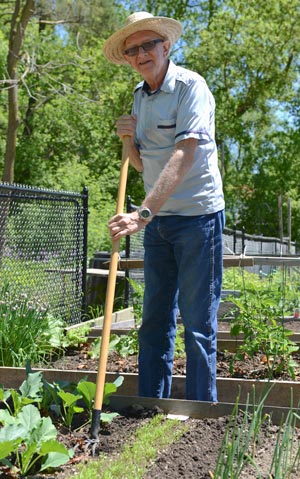Living in a townhouse with no property for a garden made it nearly impossible for Murray Heimpel to grow the kind of vegetables he wanted. Where there’s a will, there’s a way, however – a community garden was just thing.
Such gardens are among the program offerings of Woolwich Community Services.
“I had been wanting to do gardening for a number of years. I had heard about the community gardens, so I just went and asked one day, and they said ‘sure’ – they were setting up these new gardens down here,” he said.
In Elmira, there are two community gardens at Snyder Avenue and Victoria Glen. Both are at full capacity for 2017.
The community garden program, which has been running for some 25 years, provides space for 26 people or families.
Heimpel is going into his third year with the project, the active gardener plants and maintains four plots at the community garden.
“I have got just about everything in there: onions and lettuce and beets and radishes and beans and some marigolds to help with pest control, to keep bugs away. I have got spinach planted over there and endive and tomatoes, cucumbers,” he said.
When asked to pick a favourite, he chuckled: “anything that grows.”
He learned the ins and outs of how to grow a variety of both vegetable and flowers spending summers with his family tending to their home garden.

“I grew up on a farm. I am one of nine children, so we had a huge garden, probably about the size of this whole area,” motioning to the fenced-in community garden. “And spent our summers pulling weeds, transplanting plants and all of that kinds of stuff.”
The community gardens offer more than fresh food, they add to a healthy lifestyle, community interaction, and a great stress reliever.
Tina Reed, coordinator of community support with Woolwich Community Services, says the benefits go past a healthy diet.
“The garden provides an opportunity for growing fresh vegetables, lowering the family food costs as well as participants becoming involved with and getting to know other community members.”
For Heimpel the plot over the course of the summer provides his wife and himself local fresh and affordable fruits and vegetables, as well as enough to donate to the local food bank.
“I use some of it myself or we do at home and what is surplus we take down to the food bank,” he said.
The WCS food bank in Elmira uses the excess growth to supplement their food hampers.
The cost to participate is relatively low at a $5 fee per plot, but the tough part is finding an open spot.









